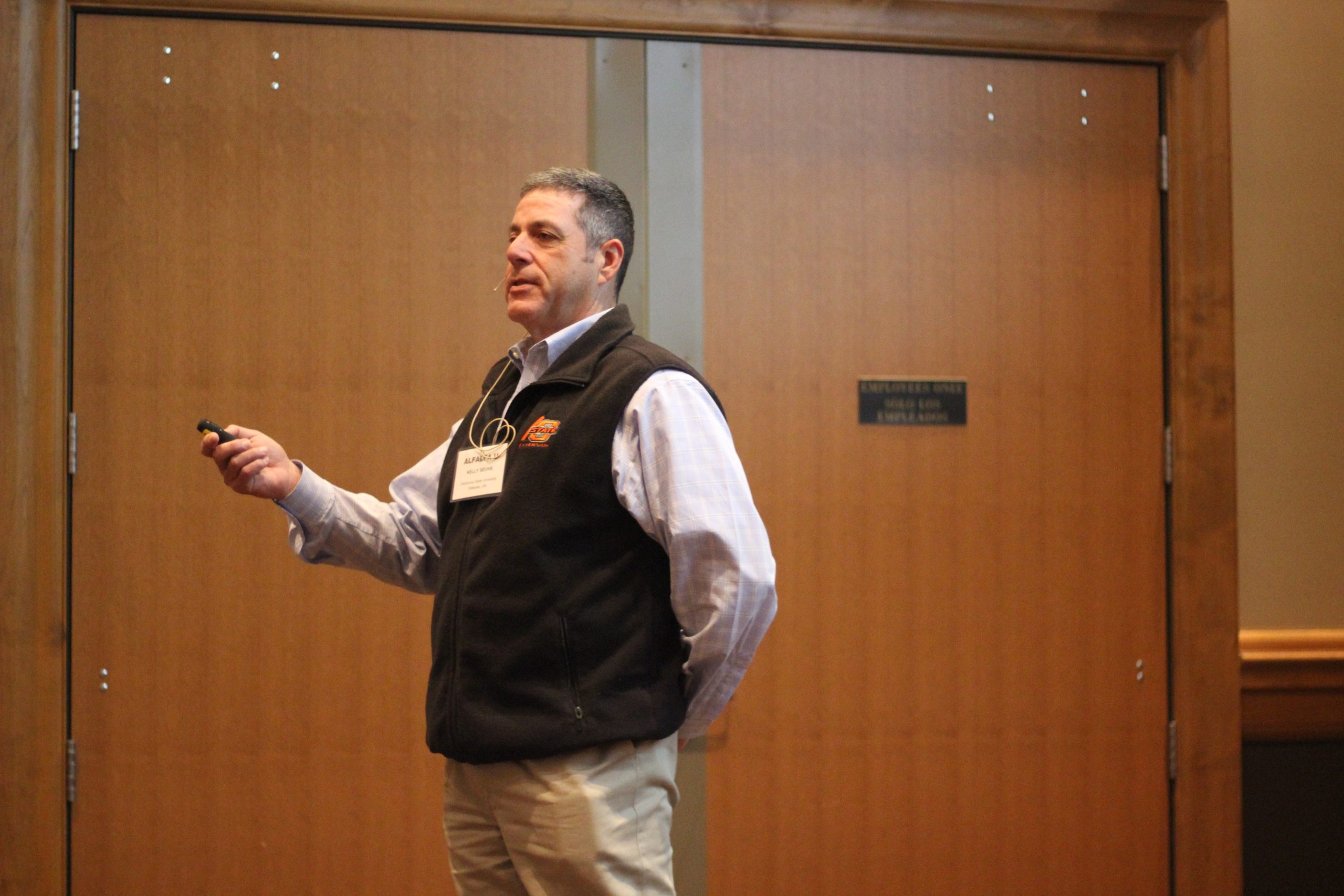OSU forage entomologist discusses alfalfa weevils

Pests are one of the factors in an alfalfa crop that can cause the most damage and preventing them are keys to a bumper crop. Kelly Seuhs, Extension specialist for forage entomology at Oklahoma State University, spoke about troublesome insects that affect alfalfa at the 2024 Alfalfa U event, held Feb. 27, in Dodge City, Kansas.
“The literature says that sometimes we have as many as 1,000 or more different species of insects in the field,” Seuhs said. “The majority of them are beneficial, but we do have some that can cause problems. If they become present in high numbers, they can reduce yield and quality for that crop.”
Seuhs said the first step with any insect challenge is to make a proper identification. He advised growers to monitor pests and assess the damage they are doing and how that population is building in a particular field.
“What are our action thresholds going to be?” Seuhs asked. “We need to know when is our peak time that we need to put out some kind of control mechanism to reduce the effects of that damage.”
Seuhs recommends a variety of integrated pest management strategies to combat insects.
“Ideally we want to use as many as we can to try to help us in control of these pests,” Seuhs said. “These include biological use of natural enemies, parasites and cultural and mechanical strategies. But unfortunately, the bottom line is that we’re probably going to have to incorporate some chemical applications to get some good control. But each situation is different.”
Alfalfa weevil
Of all the insects that can plague alfalfa, the alfalfa weevil is probably the most common that producers deal with on a yearly basis.
“Pretty much every state has it and it’s probably a problem in the majority of them,” Seuhs said. “Most of the time we have at least one round of activity that we need to control.”
He said in Oklahoma, weevil scouting starts in January, but the probability that weevils will be active is based on the degree days that occur. Seuhs said severity of alfalfa weevil damage varies from year to year, depending on the weather conditions and timing of when the insects show up in fields. Warm weather usually triggers weevil activity and that is when they can be observed during scouting trips.
“Most of the damage comes from defoliation and it can reduce stand longevity,” Seuhs said. “If that damage occurs repeatedly, it can thin the stand and cause further problems with weeds, so we want to control it as much as possible.”
Seuhs said alfalfa weevils often lays large numbers of eggs during fall and winter months and go into dormancy in the alfalfa stalks until it warms up. Once spring comes around, the eggs hatch and larvae start feeding on the alfalfa. As the temperatures in spring fluctuate from warm days to below freezing or single digits, the weevil will flourish in the heat or be set back by the cold. However, once the cold events pass, it is time to start scouting again.
“As a general rule, I put out a first insecticide application about the third week of March at about three 40-degree days,” Seuhs said. “So, weather temperature degree days could all play a big role and kind of what’s going on there.”
Seuhs said weevil damage not only affects the current crop, but the second crop as well due to lack of diggers.
“There can be quite a bit of loss for every additional one larva per stem above threshold,” he said. “It can increase dramatically if you let that damage go.”
There are several forms of integrated pest management that can prevent or reduce alfalfa weevils. Seuhs said one cultural method is to graze cattle, horses or sheep on the alfalfa stalks, which is where weevils lay their eggs. Bloat can be an issue with ruminants, but if the animals are properly managed, it is a multi-beneficial method to combat weevils and provide forage for livestock.
“If we can get that grazed down, that could save us a spring or maybe two,” Seuhs said. “It’s not going to prevent spraying, but it can push things back if the weevils have to come back into the field to start laying eggs again.”
Lacey Vilhauer can be reached at 620-227-1871 or [email protected]



